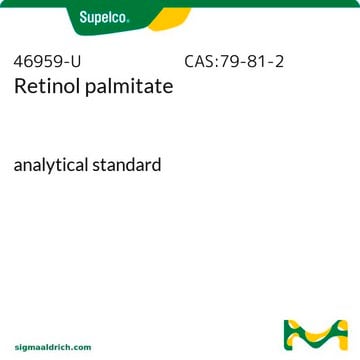47768
Ergocalciferol (D2)
analytical standard
Synonym(s):
Ergocalciferol, Calciferol, Ercalciol, Ergosterol irradiated, Irradiated ergosterol, Vitamin D2
About This Item
Recommended Products
grade
analytical standard
Quality Level
CofA
current certificate can be downloaded
feature
standard type fat soluble vitamin
packaging
ampule of 100 mg
technique(s)
HPLC: suitable
gas chromatography (GC): suitable
color
white to yellowish
mp
114-118 °C (lit.)
application(s)
agriculture
cleaning products
cosmetics
environmental
food and beverages
personal care
pharmaceutical (small molecule)
vitamins, nutraceuticals, and natural products
format
neat
shipped in
wet ice
storage temp.
−20°C
SMILES string
CC(C)[C@@H](C)/C=C/[C@@H](C)[C@@]1([H])CC[C@@]([C@]1(C)CCC/2)([H])C2=C\C=C(C[C@@H](O)CC3)/C3=C
InChI
1S/C28H44O/c1-19(2)20(3)9-10-22(5)26-15-16-27-23(8-7-17-28(26,27)6)12-13-24-18-25(29)14-11-21(24)4/h9-10,12-13,19-20,22,25-27,29H,4,7-8,11,14-18H2,1-3,5-6H3/b10-9+,23-12+,24-13-/t20-,22+,25-,26+,27-,28+/m0/s1
InChI key
MECHNRXZTMCUDQ-RKHKHRCZSA-N
Gene Information
human ... VDR(7421)
Looking for similar products? Visit Product Comparison Guide
Application
related product
Signal Word
Danger
Hazard Statements
Precautionary Statements
Hazard Classifications
Acute Tox. 2 Inhalation - Acute Tox. 3 Dermal - Acute Tox. 3 Oral - STOT RE 1 Oral
Storage Class Code
6.1A - Combustible acute toxic Cat. 1 and 2 / very toxic hazardous materials
WGK
WGK 3
Flash Point(F)
Not applicable
Flash Point(C)
Not applicable
Personal Protective Equipment
Choose from one of the most recent versions:
Already Own This Product?
Find documentation for the products that you have recently purchased in the Document Library.
Customers Also Viewed
Our team of scientists has experience in all areas of research including Life Science, Material Science, Chemical Synthesis, Chromatography, Analytical and many others.
Contact Technical Service








